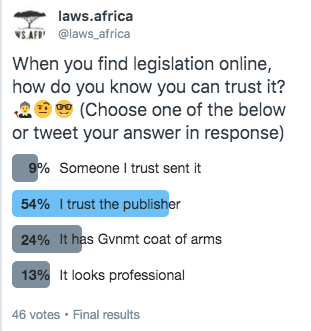Do you trust legislation that you find on the Internet?
12 June 2020, by Greg Kempe

For anyone with a mobile phone or a laptop, the Internet is the first (and often last) step most people take to find legislation and other legal information. But how do you know you can trust the legislation that you find online?
The Internet makes it much simpler for both legal practitioners and the general public to access legal information. At the same time, it also makes it much easier to unwittingly find incorrect, outdated or partial information.
At Laws.Africa we’re interested in learning how we can help users to navigate these difficulties. This has been particularly important during the COVID-19 pandemic as countries have been regularly publishing and updating regulations that directly impact our day-to-day lives.
Questions you should ask about that random PDF
As with most information you find on the Internet, it’s a good idea to be a bit skeptical about what you read. When you find a webpage or PDF of an Act or regulation, what questions should you ask before relying on it?
-
“Can I trust this legislation?” (Trustworthiness)
-
“Is it up to date?” (Completeness)
These two questions are a good starting point for determining whether what you have found is useful, or if you need to keep looking.
What our users say
We asked users about how they judge the trustworthiness and completeness of online legislation. We used a Twitter poll and a poll on the openbylaws.org.za website.

Trustworthiness
Both our Twitter poll and our website survey showed that most users establish trustworthiness by relying on a website or publisher that they already trust. In other words, the trust is transferred from the publisher to the document. Practically, this means most users look for a website name, a company logo, or a government coat of arms.
Although imperfect, this seems like a reasonable approach, since in most cases it’s impractical or impossible to verify each word in the document with the original Government Gazette publication (if one can find it).
Completeness
Legislation changes over time, in some cases very quickly. A key South African COVID-19 regulation, Government Notice 318 of 2020, was first published in mid-March 2020, amended six times over the next four weeks, and then repealed completely and replaced in late April.
How do readers ensure that what they have found is complete and up-to-date, and not missing a recently published amendment? Our survey showed that most readers rely on a combination of a “last updated at” date and checking the Government Gazette for missing amendments.
Completeness can be subtle and difficult to determine. Many documents include only the date of the most recent amendment, which has limited value, particularly if that amendment was a long time ago. It’s best to look for an “as-at” date, which is the date at which the document is known to be complete. It’s important that publishers continually update the “as-at” date on their documents to indicate to readers that they’re keeping their collection up to date.
While checking the Gazette for missing amendments is good in principle, it can be impractical since finding Gazettes can be difficult, time-consuming and expensive in its own right.
Conclusion
Asking some simple questions can help you verify legal information you find online. However, there is still a long way to go to make it faster, easier and less error-prone. We’re continuing to research this area and will publish our findings on our website.


